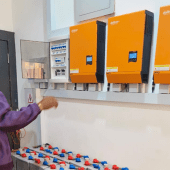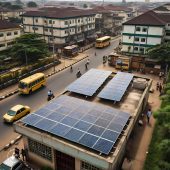Nigeria, like many other third-world countries, faces significant power challenges. The frequent power outages often referred to as “load shedding”, grid collapses, and inadequate generating capacity have become a part of daily life for many Nigerians. This unreliable electricity supply not only disrupts daily activities but also hinders economic growth and development. Moreover, the high cost of fuel and diesel generators as alternative power sources places a financial burden on households and businesses alike. Because of these, solar energy in Nigeria emerges as a promising solution to Nigeria’s power challenges, offering a reliable, sustainable, and cost-effective alternative.
Why should you go Solar?:
1. Reliable Power Supply: Switching to solar energy in Nigeria provides a consistent and reliable power supply, reducing dependence on the unstable national grid. With solar panels and battery storage systems, homeowners and businesses can ensure uninterrupted electricity, even during power outages.
2. Cost Savings: Investing in a solar energy system in Nigeria can lead to substantial long-term savings on electricity bills and high cost of fuel. Once the initial installation cost is recovered, the sun’s energy is free, allowing households and businesses to reduce or even eliminate their monthly electricity expenses.
3. Environmental Benefits: Solar energy is a clean and renewable energy source that produces no greenhouse gas emissions during operation. By harnessing solar power, Nigerians can reduce their carbon footprint and contribute to mitigating climate change.
4. Energy Independence: Solar energy provides a degree of energy independence, allowing households and businesses to generate their own electricity. This reduces reliance on generators and the national grid.
6. Job Creation and Economic Growth: The solar industry has the potential to create jobs and stimulate economic growth. From manufacturing and installation to maintenance and support services, the solar sector can contribute to job creation and skills development in Nigeria.
Conclusion:
Solar energy offers a viable solution to Nigeria’s power challenges, addressing both the reliability and affordability of electricity supply. By harnessing the abundant sunlight that Nigeria receives year-round, households and businesses can enjoy a reliable, sustainable, and cost-effective energy source. Furthermore, transitioning to solar energy aligns with global efforts to combat climate change and reduce greenhouse gas emissions.
In conclusion, by harnessing solar energy solutions, Nigeria can not only address its current power challenges but also pave the way for a brighter, more sustainable future for all its citizens. It’s time to power Nigeria with the sun!





